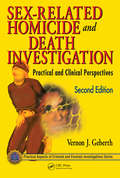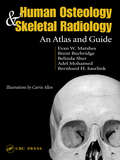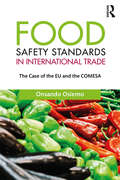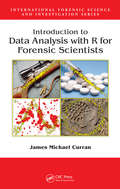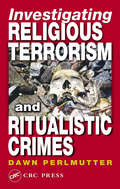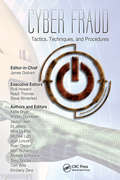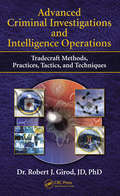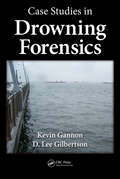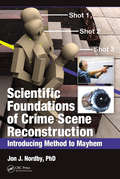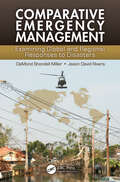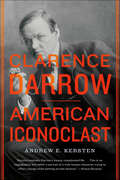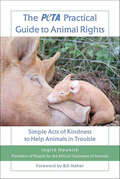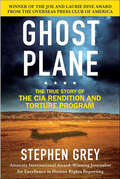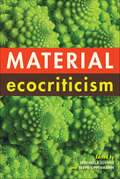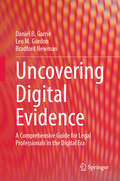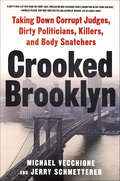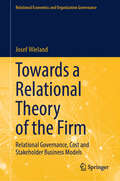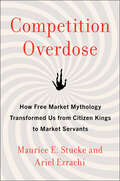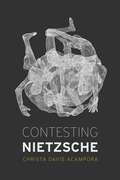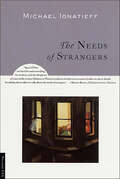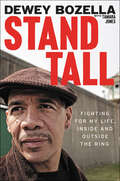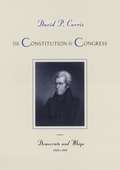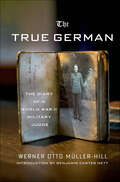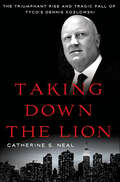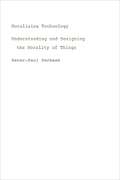- Table View
- List View
Sex-Related Homicide and Death Investigation: Practical and Clinical Perspectives, Second Edition (Practical Aspects of Criminal and Forensic Investigations)
by Vernon J. GeberthRemember: Do it right the first time. You only get one chance.Vernon J. Geberth, M.S., M.P.S., 1980, Homicide and Forensic Consultant, Author of Practical Homicide Investigation and the Series Editor of Practical Aspects of Criminal and Forensic Investigations.In Practical Homicide Investigation, renowned author and investigator Vernon J. Gebert
Human Osteology and Skeletal Radiology: An Atlas and Guide
by Evan W. Matshes Bernard JuurlinkHuman Osteology and Skeletal Radiology: An Atlas and Guide features nearly 700 photographs, line drawings, and radiographs demonstrating individual bones and collections of bones from a wide variety of detailed perspectives to aid in rapid identification of bone material. Intended as a handbook for those investigating skeletal remains, this atlas covers general and specific anatomic terms, includes comparative images of bones in photographic and radiographic form, and notes important comparisons among adult, juvenile, and fetal bones. It also provides a resource for those involved in gross anatomy and skeletal specimen laboratory study.
Food Safety Standards in International Trade: The Case of the EU and the COMESA
by Onsando OsiemoFood safety has become a major concern for consumers in the developed world and Europe in particular. This has been highlighted by the recent spate of food scares ranging from the BSE (mad cow) crisis to Chinese melamine contamination of baby formula. To ensure food safety throughout Europe, stringent food safety standards have been put in place ‘from farm to fork’. At the same time, poor African countries in the COMESA rely on their food exports to the European market to achieve their development goals yet have difficulty meeting the EU food safety standards. This book examines the impact of EU food safety standards on food imports from COMESA countries. It also critically examines both EU and COMESA food safety standards in light of the WTO SPS Agreement and the jurisprudence of the WTO panels and Appellate Body. The book makes ground-breaking proposals on how the standards divide between the EU and the COMESA can be bridged and discusses the impact of EU food safety standards on food imports from poor African countries.
Introduction to Data Analysis with R for Forensic Scientists (International Forensic Science and Investigation)
by James Michael CurranStatistical methods provide a logical, coherent framework in which data from experimental science can be analyzed. However, many researchers lack the statistical skills or resources that would allow them to explore their data to its full potential. Introduction to Data Analysis with R for Forensic Sciences minimizes theory and mathematics and focus
Investigating Religious Terrorism and Ritualistic Crimes
by Dawn PerlmutterThe legalities of particular religious practices depend on many factors, such as the type of occult or religious activity, the current laws, and the intention of the individual practitioner. Written by the director of the Institute for the Research of Organized and Ritual Violence, Investigating Religious Terrorism and Ritualistic Crimes is the fir
Cyber Fraud: Tactics, Techniques and Procedures
by Rick HowardWith millions lost each year, cyber crime has evolved from a minor nuisance to a major concern involving well-organized actors and highly sophisticated organizations. Arguably one of the most important challenges of the 21st century, with millions lost each year, cyber crime has evolved from a minor nuisance to a major concern involving well-organized actors and highly sophisticated organizations. This volume explores the state of threats present in the cyber fraud underground. It discusses phishing/pharming, trojans/toolkits, direct threats, and pump-and-dump scams. By examining the operations of the cyber criminal, the book provides perspective into the general incentives, risks, and behavioral patterns of the fraudsters. Armed with this information, organizations and individuals are better able to develop countermeasures and crafting tactics to disrupt the fraud underground and secure their systems.
Advanced Criminal Investigations and Intelligence Operations: Tradecraft Methods, Practices, Tactics, and Techniques
by Robert J GirodTradecraft is a term used within the intelligence community to describe the methods, practices, and techniques used in espionage and clandestine investigations. Whether the practitioner is a covert agent for the government or an identity thief and con man, the methods, practices, tactics, and techniques are often the same and sometimes learned from
Case Studies in Drowning Forensics
by Kevin Gannon D. Lee GilbertsonWhen a corpse is found in a body of water, authorities generally presume that the manner of death was either an accident or a suicide. They do not treat the recovery site as a potential crime scene or homicide, so many cases remain unsolved. Case Studies in Drowning Forensics investigates the cases of 13 bodies recovered from water in similar circu
Scientific Foundations of Crime Scene Reconstruction: Introducing Method to Mayhem
by Ph.D., Jon NordbyPhilosophers of science have long used reconstructive reasoning to develop historical explanations covering the origins of natural phenomenon. The application of the scientific method is a powerful tool for solving crimes through reconstruction of the events. Scientific Foundations of Crime Scene Reconstruction: Introducing Method to Mayhem demonst
Comparative Emergency Management: Examining Global and Regional Responses to Disasters
by Jason David Rivera DeMond Shondell MillerA host of natural and man-made disasters have plagued the world in the twenty-first century, many with significant global impact. The Deepwater Horizon Oil Spill, the Indian Ocean tsunami, and Hurricane Katrina all affected broad regions with devastating results. The need for better emergency management policies, procedures, and cooperation among n
Clarence Darrow: American Iconoclast
by Andrew E. KerstenClarence Darrow is best remembered for his individual cases, whether defending the thrill killers Leopold and Loeb or John Scopes's right to teach evolution in the classroom. In the first full-length biography of Darrow in decades, the historian Andrew E. Kersten narrates the complete life of America's most legendary lawyer and the struggle that defined it, the fight for the American traditions of individualism, freedom, and liberty in the face of the country's inexorable march toward modernity. Prior biographers have all sought to shoehorn Darrow, born in 1857, into a single political party or cause. But his politics do not define his career or enduring importance. Going well beyond the familiar story of the socially conscious lawyer and drawing upon new archival records, Kersten shows Darrow as early modernity's greatest iconoclast. What defined Darrow was his response to the rising interference by corporations and government in ordinary working Americans' lives: he zealously dedicated himself to smashing the structures and systems of social control everywhere he went. During a period of enormous transformations encompassing the Gilded Age and the Progressive Era, Darrow fought fiercely to preserve individual choice as an ever more corporate America sought to restrict it.
The PETA Practical Guide to Animal Rights: Simple Acts of Kindness to Help Animals in Trouble
by Ingrid NewkirkWith more than two million members and supporters, People for the Ethical Treatment of Animals (PETA) is the world's largest animal-rights organization, and its founder and president, Ingrid Newkirk, is one of the most well-known and most effective activists in America. She has spearheaded worldwide efforts to improve the treatment of animals in manufacturing, entertainment, and elsewhere. Every day, in laboratories, food factories, and other industries, animals by the millions are subjected to inhumane cruelty. In this accessible guide, Newkirk teaches readers hundreds of simple ways to stop thoughtless animal cruelty and make positive choices. For each topic, Newkirk provides hard facts, personal insight, inspiration, ideas, and resources, including: • How to eat healthfully and compassionately • How to adopt animals rather than support puppy mills • How to make their vote count and change public opinion • How to switch to cruelty-free cosmetics and clothing • How to choose amusements that protect rather than exploit animals. With public concern for the well-being of animals greater than ever—particularly among young people—this timely, practical book offers exciting and easy ways to make a difference.
Ghost Plane: The True Story of the CIA Rendition and Torture Program
by Stephen GreyFor the first time, Stephen Grey tells the inside story of international prisons sanctioned by the U.S. Government and used by the CIA to hold and torture people suspected of terrorism. Using contacts deep inside the U.S. Government, Grey reveals how deeply the Bush administration is involved in the program and questions the truth of statements made by Secretary of State Condoleeza Rice. He also shines a spotlight on the heads of European nations who turned a blind eye to the program when it showed up in their back yards. Grey takes an unflinching look at a horrendous practice that scorns Geneva Convention rules and is powered by corruption at the highest levels of governments worldwide. Through his unprecedented access to CIA flight records and dozens of sources at the senior levels of the current administration, Grey has produced a story of flight plans, extreme torture, and the clash of religions and governmental posturing that goes on today. Ghost Plane tells the stories of individuals abducted at airports around the world and transported for interrogation and torture on a fleet of leased planes manned by CIA operatives. Grey paints a disburing ethical picture of the war on terror and lays the responsibility for abduction and torutre at the doorstep of Washington, D.C.
Material Ecocriticism
by Serenella Iovino Serpil OppermannMaterial Ecocriticism offers new ways to analyze language and reality, human and nonhuman life, mind and matter, without falling into well-worn paths of thinking. Bringing ecocriticism closer to the material turn, the contributions to this landmark volume focus on material forces and substances, the agency of things, processes, narratives and stories, and making meaning out of the world. This broad-ranging reflection on contemporary human experience and expression provokes new understandings of the planet to which we are intimately connected.
Uncovering Digital Evidence: A Comprehensive Guide for Legal Professionals in the Digital Era
by Daniel B. Garrie Leo M. Gordon Bradford NewmanThis book serves as a comprehensive guide for legal practitioners, providing a primer on digital forensic evidence and essential technological concepts. Through real-world examples, this book offers a systematic overview of methodologies and best practices in collecting, preserving, and analyzing digital evidence. Grounded in legal precedent, the following chapters explain how digital evidence fits within existing legal frameworks, addressing questions of admissibility, authenticity, and ethical considerations. The aim of this book is to bridge the digital knowledge gap that often hinders the legal process, empowering readers with the tools needed for effective engagement in tech-related legal matters. Ultimately, the book equips judges, lawyers, investigators, and jurists with the knowledge and skills to navigate the digital dimensions of legal cases proficiently.
Crooked Brooklyn: Taking Down Corrupt Judges, Dirty Politicians, Killers, and Body Snatchers
by Jerry Schmetterer Michael VecchioneA thrilling memoir from the former chief of the Brooklyn District Attorney's Rackets Division, who took on organized crime, crooked cops, and con men, rarely losing a caseFrom 2001 to 2013, Mike Vecchione was chief of the Rackets Division in the Brooklyn District Attorney's office, which was the largest urban prosecution agency in the country. Vecchione grappled with organized crime and dirty politicians, during which he supervised, investigated, and prosecuted major felony cases.Crooked Brooklyn is a gritty story of corruption, greed and law enforcement. Vecchione navigated a political minefield and expertly rose to the judicial challenges of directing investigations into a wide variety of crimes, from bribe-taking judges to cold-blooded killers. He was responsible for taking down:- Three state Supreme Court judges- One of the most powerful political bosses in the country- Two cops who worked as assassins for the Mafia- A State Assemblywoman- An FBI agent- A corrupt oral surgeon who was secretly selling bones from the recently deceased to medical supply companiesUnbelievable and unforgettable, Crooked Brooklyn is filled with characters and stories ripped straight from the tabloids, great for fans who enjoy Law & Order, readers of true crime and those hungry for details about the system that keeps us safe.
Towards a Relational Theory of the Firm: Relational Governance, Cost and Stakeholder Business Models (Relational Economics and Organization Governance)
by Josef WielandThis book lays the groundwork for a relational theory of the firm as a network of stakeholder resources and interests. Drawing on the author’s earlier publications on relational economics as the political economy of a global cooperative economy or stakeholder capitalism, it explores the governance and managerial implications of a relational economy for firms, while also critically revisiting the traditional and resource-based view of the firm. In turn, it explains concepts such as relational governance, relational costs, relational spaces, rent from cooperation, and shared value creation, as well as a dynamic and process-oriented relational business model. The book discusses the epistemological and methodological prerequisites of a relational theory of the firm and addresses their theoretical taxonomy. A relational theory of the firm is a work in progress; the book represents an invitation to join this theoretical and empirical undertaking.
Competition Overdose: How Free Market Mythology Transformed Us from Citizen Kings to Market Servants
by Ariel Ezrachi Maurice E. StuckeUsing dozens of vivid examples to show how society overprescribed competition as a solution and when unbridled rivalry hurts consumers, kills entrepreneurship, and increases economic inequality, two free-market thinkers diagnose the sickness caused by competition overdose and provide remedies that will promote sustainable growth and progress for everyone, not just wealthy shareholders and those at the top.Whatever illness our society suffers, competition is the remedy. Do we want better schools for our children? Cheaper prices for everything? More choices in the marketplace? The answer is always: Increase competition. Yet, many of us are unhappy with the results. We think we’re paying less, but we’re getting much less. Our food has undeclared additives (or worse), our drinking water contains toxic chemicals, our hotel bills reveal surprise additions, our kids’ schools are failing, our activities are tracked so that advertisers can target us with relentless promotions. All will be cured, we are told, by increasing the competitive pressure and defanging the bloated regulatory state.In a captivating exposé, Maurice E. Stucke and Ariel Ezrachi show how we are falling prey to greed, chicanery, and cronyism. Refuting the almost religious belief in rivalry as the vehicle for prosperity, the authors identify the powerful corporations, lobbyists, and lawmakers responsible for pushing this toxic competition—and argue instead for a healthier, even nobler, form of competition.Competition Overdose diagnoses the disease—and provides a cure for it.
Contesting Nietzsche
by Christa Davis AcamporaA brilliant exploration of a significant and understudied aspect of Nietzsche’s philosophy. In this groundbreaking work, Christa Davis Acampora offers a profound rethinking of Friedrich Nietzsche’s crucial notion of the agon. Analyzing an impressive array of primary and secondary sources and synthesizing decades of Nietzsche scholarship, she shows how the agon, or contest, organized core areas of Nietzsche’s philosophy, providing a new appreciation of the subtleties of his notorious views about power. By focusing so intensely on this particular guiding interest, she offers an exciting, original vantage from which to view this iconic thinker: Contesting Nietzsche. Though existence—viewed through the lens of Nietzsche’s agon—is fraught with struggle, Acampora illuminates what Nietzsche recognized as the agon’s generative benefits. It imbues the human experience with significance, meaning, and value. Analyzing Nietzsche’s elaborations of agonism—his remarks on types of contests, qualities of contestants, and the conditions in which either may thrive or deteriorate—she demonstrates how much the agon shaped his philosophical projects and critical assessments of others. The agon led him from one set of concerns to the next, from aesthetics to metaphysics to ethics to psychology, via Homer, Socrates, Saint Paul, and Wagner. In showing how one obsession catalyzed so many diverse interests, Contesting Nietzsche sheds fundamentally new light on some of this philosopher’s most difficult and paradoxical ideas.
The Needs of Strangers
by Michael IgnatieffThis thought provoking book uncovers a crisis in the political imagination, a wide-spread failure to provide the passionate sense of community "in which our need for belonging can be met." Seeking the answers to fundamental questions, Michael Ignatieff writes vividly both about ideas and about the people who tried to live by them-from Augustine to Bosch, from Rousseau to Simone Weil. Incisive and moving, The Needs of Strangers returns philosophy to its proper place, as a guide to the art of being human.
Stand Tall: Fighting for My Life, Inside and Outside the Ring
by Tamara Jones Dewey BozellaThe inspiring story of one man’s fight against his wrongful incarceration and his eventual triumph—both inside and outside the boxing ring.In the late 1970s, Dewey Bozella was wrongfully convicted of murdering Emma Crapser, a ninety-two-year-old resident of Poughkeepsie, New York. Sentenced to twenty years to life in prison, Bozella fiercely maintained his innocence throughout his ordeal at Sing Sing Correctional Facility, and even refused the prosecutor’s offer of freedom in exchange for an admission of guilt. But in 2009, more than a quarter century later, Dewey Bozella would reclaim his identity and his humanity when his conviction was vacated.In this raw and uplifting memoir, Bozella takes us through the trials, tribulations, and joys of his life inside prison and, eventually, as a free man. While at Sing Sing, he took up boxing to channel his anger, and eventually became the prison’s light-heavyweight champion. Bozella also met and married the love of his life from behind bars, lost countless parole hearings, and spent agonizing time on a cell block with both his brother’s murderer and, it turned out, the true crim-inal in whose place Bozella served so much time. But Bozella never gave up. After he was refused parole and had his sentence extended, the Innocence Project caught word of his case. Thanks to his undying faith, stalwart persistence, and the aid of a young pro bono attorney at the Innocence Project who doggedly worked toward Bozella’s release when all hope seemed lost, he was released from prison in 2009. Shortly thereafter, he won his professional boxing debut against Larry Hopkins, started an afterschool athletics program for at-risk youth, and was awarded the Arthur Ashe Award for Courage.An incredibly uplifting underdog story, Stand Tall recounts one man’s perseverance in the face of injustice and his difficult road to freedom.
The Constitution in Congress: Democrats and Whigs, 1829–1861
by David P. CurrieThe Constitution in Congress series has been called nothing less than a biography of the US Constitution for its in-depth examination of the role that the legislative and executive branches have played in the development of constitutional interpretation. This third volume in the series, the early installments of which dealt with the Federalist and Jeffersonian eras, continues this examination with the Jacksonian revolution of 1829 and subsequent efforts by Democrats to dismantle Henry Clay’s celebrated “American System” of nationalist economics. David P. Currie covers the political events of the period leading up to the start of the Civil War, showing how the slavery question, although seldom overtly discussed in the debates included in this volume, underlies the Southern insistence on strict interpretation of federal powers. Like its predecessors, The Constitution in Congress: Democrats and Whigs will be an invaluable reference for legal scholars and constitutional historians alike.
The True German: The Diary of a World War II Military Judge
by Werner Otto Müller-HillA recently discovered diary held by a German military judge from 1944 to 1945 sheds new light on anti-Hitler sentiments inside the German army.Werner Otto Müller-Hill served as a military judge in the Werhmacht during World War II. From March 1944 to the summer of 1945, he kept a diary, recording his impressions of what transpired around him as Germany hurtled into destruction—what he thought about the fate of the Jewish people, the danger from the Bolshevik East once an Allied victory was imminent, his longing for his home and family and, throughout it, a relentless disdain and hatred for the man who dragged his beloved Germany into this cataclysm, Adolf Hitler and the Nazi party. Müller-Hill calls himself a German nationalist, the true Prussian idealist who was there before Hitler and would be there after. Published in Germany and France, Müller-Hill's diary The True German has been hailed as a unique document, praised for its singular candor and uncommon insight into what the German army was like on the inside. It is an extraordinary testament to a part of Germany's people that historians are only now starting to acknowledge and fills a gap in our knowledge of WWII.
Taking Down the Lion: The Triumphant Rise and Tragic Fall of Tyco's Dennis Kozlowski
by Catherine S. NealTaking Down the Lion offers an inside look at the career of Tyco's most infamous CEO, and what exactly brought him down so publicly.As the widely-admired CEO of Tyco International, Dennis Kozlowski grew a little-known New Hampshire conglomerate into a global giant. In a stunning series of events, Kozlowski suddenly lost his job along with his favored public status when he was indicted by legendary Manhattan DA Robert Morgenthau—it was an inglorious end to an otherwise brilliant career. Kozlowski was the face of corporate excess in the turbulent post-Enron environment; he was pictured under headlines that read "Oink Oink," and publicly castigated for his extravagant lifestyle. "Deal-a-Day Dennis" was transformed into the "poster child for corporate greed." Kozlowski was ultimately convicted of grand larceny and other crimes that, in sum, found the former CEO guilty of wrongfully taking $100 million from Tyco.Taking Down the Lion shines a bright light on former CEO Dennis Kozlowski and the Tyco corporate scandal—it is the definitive telling of a largely misunderstood episode in U.S. business history. In an unfiltered view of corporate America, Catherine S. Neal pulls back the curtain to reveal a world of big business, ambition, money, and an epidemic of questionable ethics that infected not only business dealings but extended to attorneys, journalists, politicians, and the criminal justice system. When the ugly truth is told, it's clear the "good guys" were not all good and the "bad guys" not all bad. And there were absolutely no heroes.
Moralizing Technology: Understanding and Designing the Morality of Things
by Peter-Paul VerbeekTechnology permeates nearly every aspect of our daily lives. Cars enable us to travel long distances, mobile phones help us to communicate, and medical devices make it possible to detect and cure diseases. But these aids to existence are not simply neutral instruments: they give shape to what we do and how we experience the world. And because technology plays such an active role in shaping our daily actions and decisions, it is crucial, Peter-Paul Verbeek argues, that we consider the moral dimension of technology. Moralizing Technology offers exactly that: an in-depth study of the ethical dilemmas and moral issues surrounding the interaction of humans and technology. Drawing from Heidegger and Foucault, as well as from philosophers of technology such as Don Ihde and Bruno Latour, Peter-Paul Verbeek locates morality not just in the human users of technology but in the interaction between us and our machines. Verbeek cites concrete examples, including some from his own life, and compellingly argues for the morality of things. Rich and multifaceted, and sure to be controversial, Moralizing Technology will force us all to consider the virtue of new inventions and to rethink the rightness of the products we use every day.
